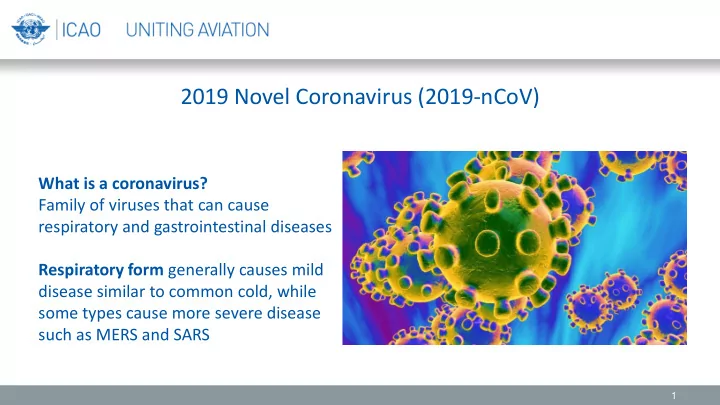

2019 Novel Coronavirus (2019-nCoV) What is a coronavirus? Family of viruses that can cause respiratory and gastrointestinal diseases Respiratory form generally causes mild disease similar to common cold, while some types cause more severe disease such as MERS and SARS 1
What are the known facts about the disease? • It originated at the seafood and live animal market in Wuhan, China • It is caused by a novel coronavirus (called 2019-nCoV) • Infection with this virus cause respiratory disease ranging from mild to severe disease in approximately 20% of the cases. What is NOT known about the disease? • Where it originally came from? • How virulent it is and when? • How easily it spreads among people? • Rate of mortality? 2
Zoonotic disease – spillover to humans 3
Transmission - How are coronaviruses spread? Human coronaviruses are usually spread through droplets (coughing) and close personal unprotected contact with infected person (kissing, touching…) What are the symptoms? Signs and symptoms are typically respiratory and range from mild to severe. There can be mild symptoms such as fever, cough and shortness of breath. In more severe cases there has been pneumonia, kidney failure and death Diagnosis PCR (Polymerase Chain Reaction) Treatment Symptomatic, supportive care (treatment and vaccines in development) 4
Key preventive measure • Greet each other without personal contact • Try to maintain a distance of 1 meter between you and others • Wash your hands frequently with soap and water or use hand sanitizer • Wear mask properly, learn how to put it on, take it off. If it becomes moist, replace it • Cover your mouth and nose with a tissue or flexed elbow when you cough or sneeze • If you have any cold-like symptoms, stay at home and seek medical care early • WHO strongly recommends receiving the vaccine against flu 5
Up-to-date information WHO Thailand website: https://www.who.int/emergencies/diseases/novel- coronavirus-2019/situation-reports/ Ministry of Public Health 2019-nCoV landing page: https://ddc.moph.go.th/viralpneumonia/eng/index.php For a comprehensive 2019-nCoV global case-tracker, via data visualization including maps and charts, access the Johns Hopkins University’s Centre for Systems Science and Engineering (CSSE): https://gisanddata.maps.arcgis.com/apps/opsdashboard/index.html#/bda7594740fd4 0299423467b48e9ecf6 6
• Total confirmed cases: 43099 • Total number of deaths: 1016 • Confirmed cases in Thailand: 32 • 375 persons under observation in Thailand 7
8
Actions taken at APAC Office • Information leaflet about the virus and personal prevention shared with meeting participants and placed on the meeting website • General sanitary measures increased • Surgical masks available and distributed to staff upon request • Liquid sanitizers placed on strategic locations • Security guards and cleaning ladies required to wear mask during work 9
Situation at the RSO Beijing • RSO follows the decisions and guidelines issued by the UN Senior Management Team • The situation is continuously monitored and reviewed • The staff are authorized to work from home until 21 February • GBAS SBAS Task Force from 2 – 4 March in Japan which will be administered by RSO will be confirmed at a later stage 10
11
Recommend
More recommend